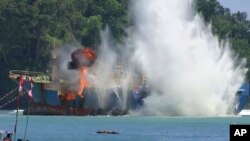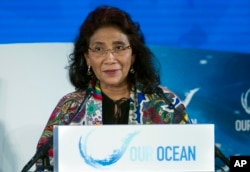Susi Pudjiastuti, Indonesia's minister of marine affairs, who is known for blowing up foreign fishing ships that trespass into her nation's waters, has urged the United Nations to declare illegal, unreported and unregulated fishing (IUUF) an organized crime.
IUUF is not a new entry in the annals of international crimes. But as more nations are working to manage their resources to prevent overfishing in their offshore and coastal waters, IUUF is a growing concern, according to the U.N.
Although hard numbers are difficult to gather, the world's fisheries in 2012 produced roughly 160 million tons of fish and generated over $129 billion in exports while providing nutrition for billions of people, according to World Bank data.
Speaking at the U.N. Ocean Conference this week in New York City, Pudjiastuti said fishing boat crews involved in IUUF "are involved not only in fish crimes but also smuggling drugs, weapons and other illegal economic products, even human trafficking. This disrupts domestic economic competition because the perpetrators have no cost and gain so much profit."
There is little disagreement that billions of dollars, or even tens of billions, are at stake with IUUF each year.
Dependent on ocean, fishing
According to the World Bank, Indonesia, which has 2.6 million fishermen and 140 million citizens who rely on marine and coastal economic systems, claims IUUF losses up to tens of millions of dollars per year.
Pudjiastuti has been pushing to make illegal fishing a transnational crime since 2015.
She has the backing of General Assembly President Peter Thomson, a diplomat from Fiji, a Pacific Island nation that "is extremely reliant on marine resources from an economic and food security perspective," according to a study by the David and Lucile Packard Foundation.
"I welcome Indonesia's efforts in this field. IUUF is indeed a transnational crime," Thomson told VOA Indonesia. "Ultimately, it is the responsibility of all parties, international organizations, governments, civil society, NGOs and the scientific community. This is not just an individual's responsibility but the responsibility of all of us."
With others at the conference, Thomson also spoke out against the plague of plastic waste polluting the world's oceans.
WATCH: UN Official Peter Thomson: 'The Ocean Is in Deep Trouble'
"The sea is in the midst of a plastic-and-pollution disaster," he said. "If we don't act, there will be more plastic than fish in 2050."
Indonesians, who produce more ocean waste than any nation other than China, rallied to this issue at the conference. Among the Indonesian delegates were Melati and Isabel Wijsen, two Bali teenagers who initiated Bye Bye Plastic Bags, the community movement that aims to reduce plastic waste.
Sustainable goals
Combating IUUF is one of the U.N. Sustainable Development Goals, which include steps to end overfishing; end illegal, unreported and unregulated fishing and destructive fishing practices; and implement science-based management plans. The U.N. hopes the steps restore fish stocks in the shortest time feasible, at least to levels that can produce maximum sustainable yield as determined by their biological characteristics.
The Sustainable Development Goals were adopted by all 193 heads of state via a U.N. resolution in September 2015 at a special Summit of the United Nations in New York.
Pudjiastuti is both revered and criticized for her hard-line approach to combat illegal fishing. Last year, Indonesia, made up of more than 17,000 islands, sank 60 foreign fishing ships as part of its independence day celebrations.
In May, Pudjiastuti was one of the recipients of the Peter Benchley Ocean Award — named after the author of Jaws. She was cited for her efforts in protecting Indonesia's marine ecosystem, as well as tackling poachers and organized crime.
About 10,000 vessels a year use to fish in Indonesian waters, but that has stopped. "We catch them and we sink them, and it has been an effective deterrence," she said.
Since taking office in 2014, after a three-decade career as a seafood entrepreneur, Pudjiastuti has blown up hundreds of vessels, but the tactic has created tensions with regional neighbors.
China causes concerns
Indonesian officials are particularly worried about China's expansion of its fishing fleets and occasional forays into the waters of other countries in the region.
In the past, Pudjiastuti has said they have captured few Chinese vessels, which are big, fast and often accompanied by their nation's coast guard.
But she continues to push for an end to IUUF.
"It's better to have an idea that is too early than too late," she said. "I am proud that Indonesia is thinking about this ahead of other countries, and that we have actually done it, not just talk about it."
This report originated with VOA Indonesia.


